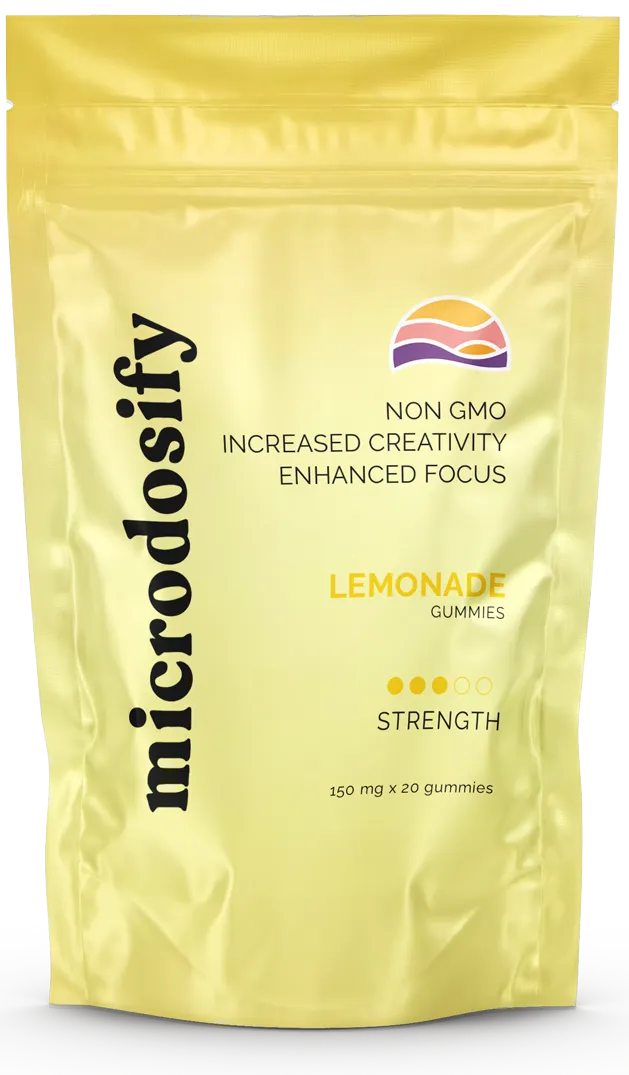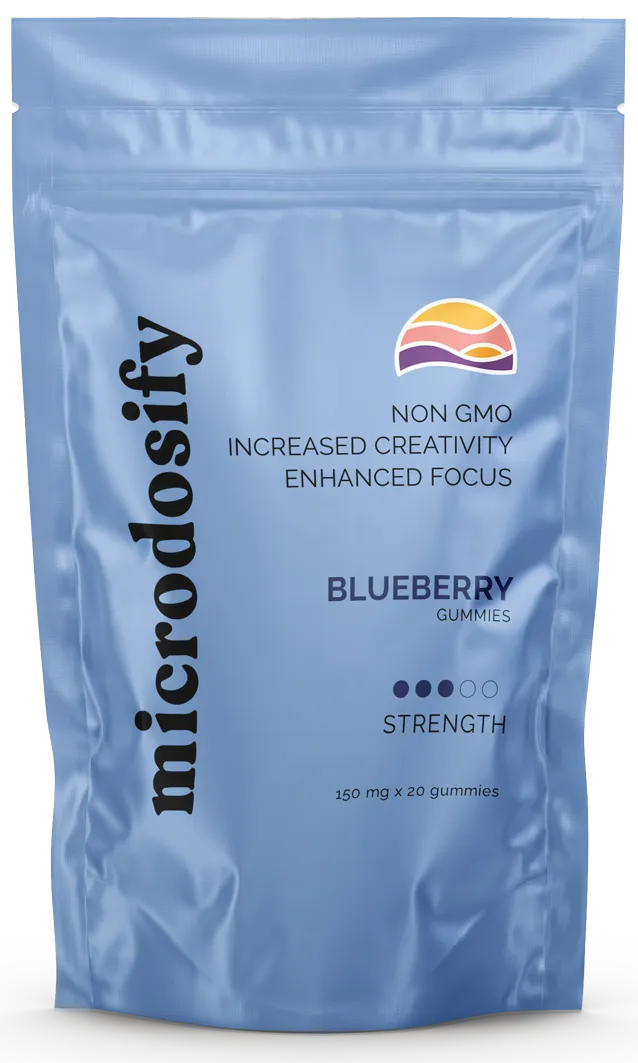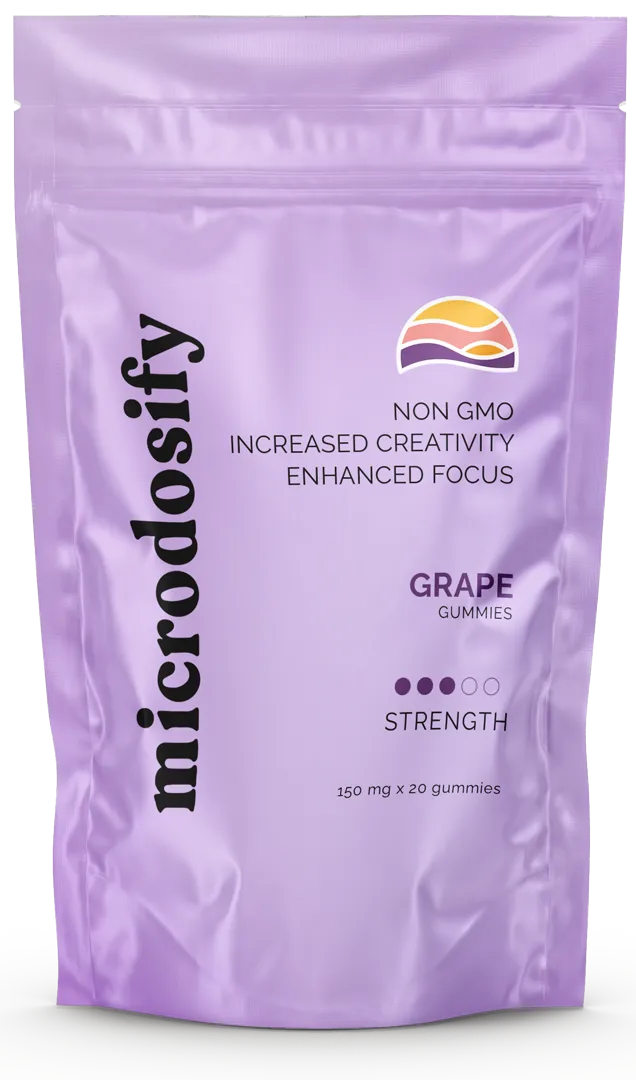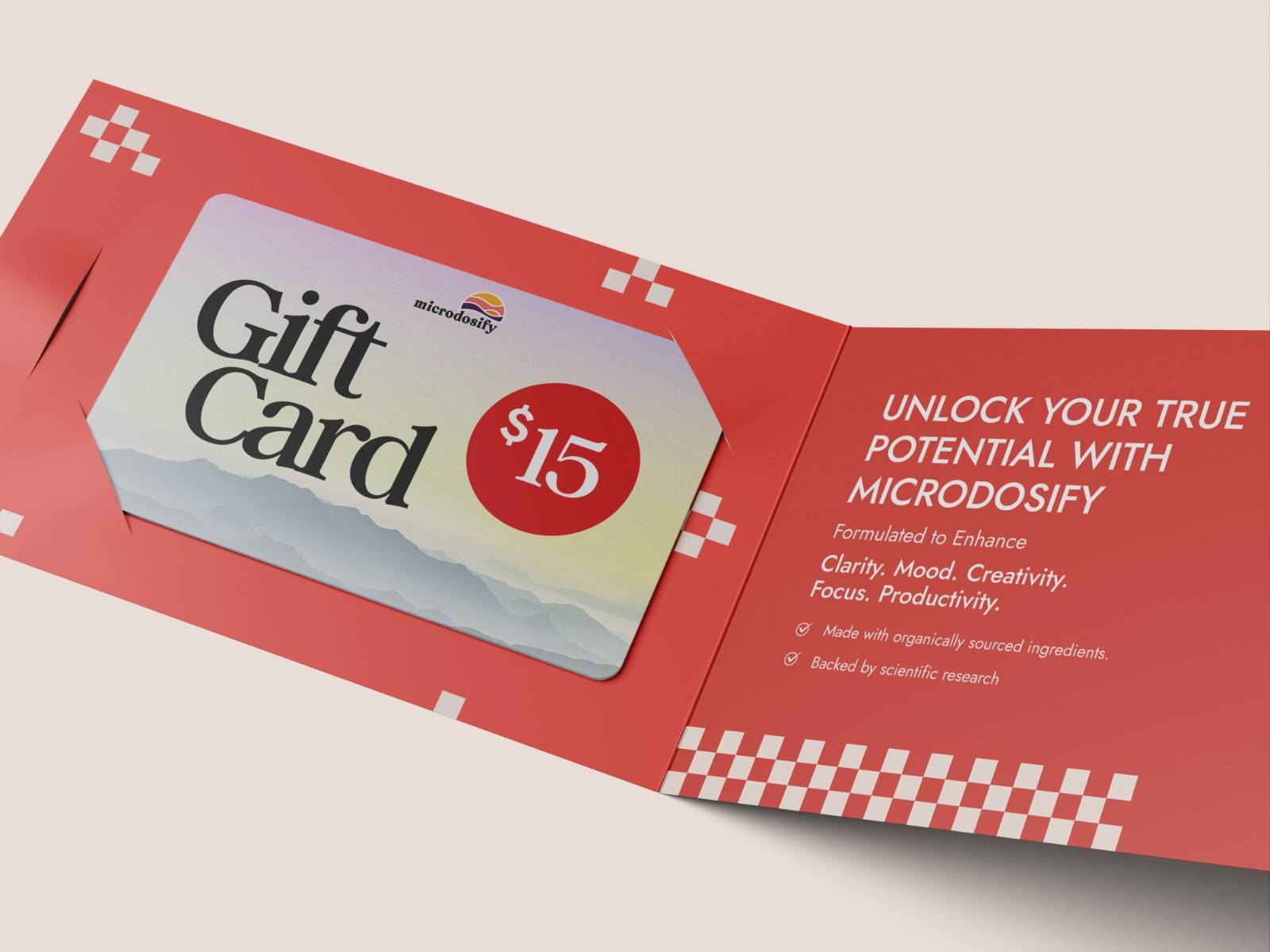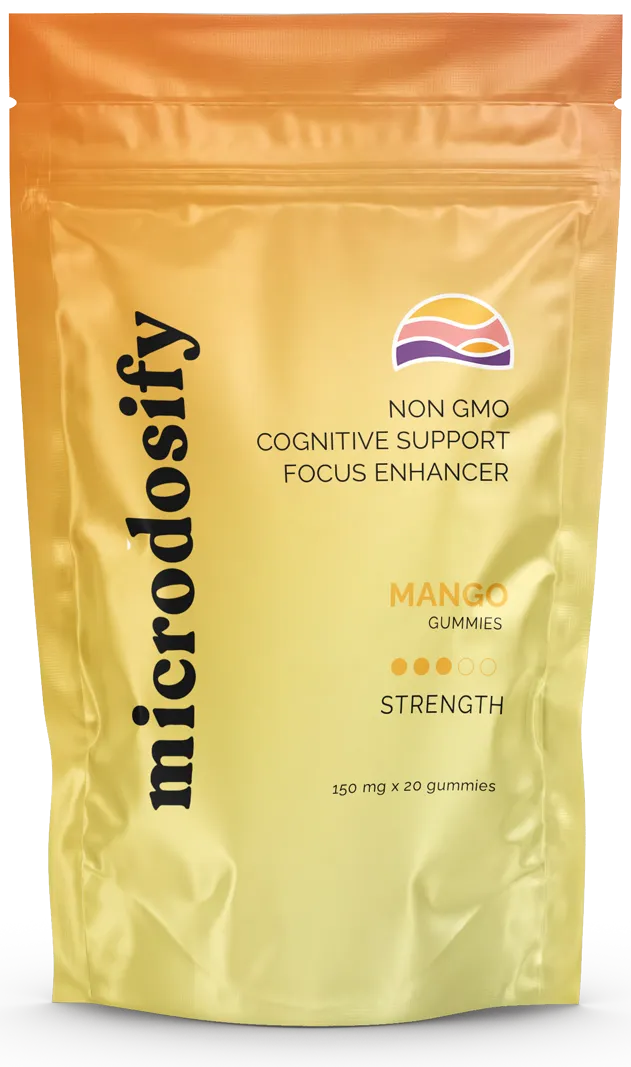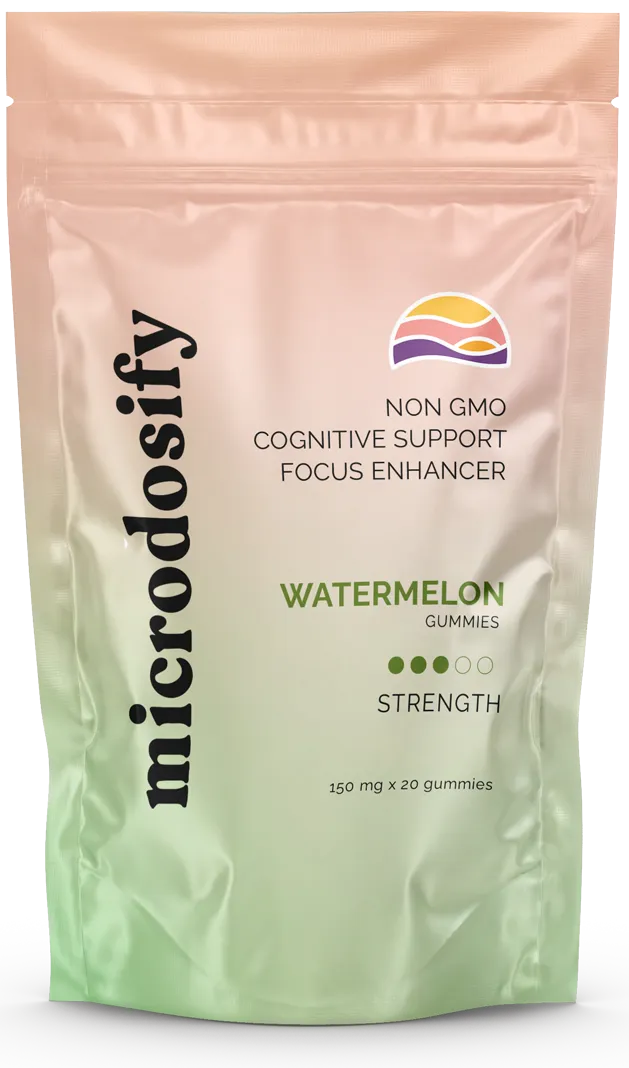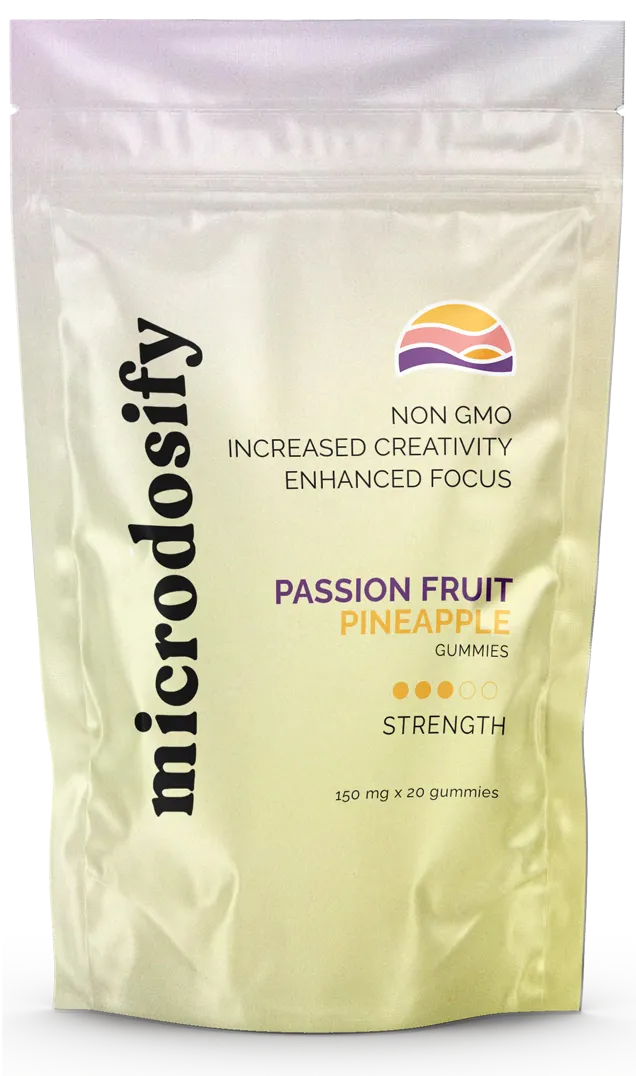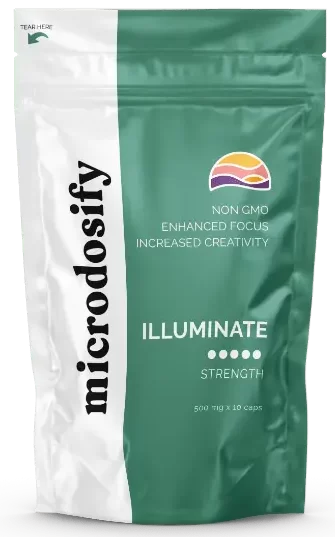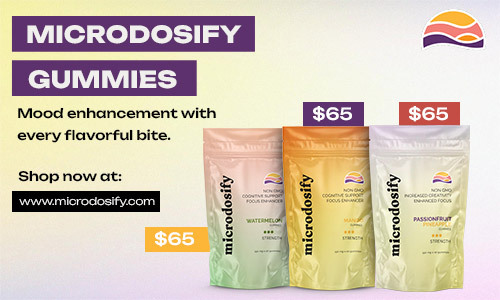What Is Psilocybin Therapy? Benefits, Risks and Everything You Need to Know
Proponents believe that this combination can fast track healing, and may even offer alternative support for mental health conditions, such as PTSD, in which traditional talk therapies have yielded mixed results for many individuals. Psychedelic therapy is also being investigated for support in other mental health conditions such as depression, anxiety, and addiction.
In this article, we’ll explore how psilocybin therapy might work, how most therapy sessions are structured, as well as the benefits and risks.
Let’s jump in!
What Is Psilocybin-assisted Therapy?
Psilocybin-assisted therapy is an innovative approach that combines the unique properties of psilocybin mushrooms with the guiding hand of therapeutic support. This dynamic duo works together to address a range of mental health challenges.
The key features of psilocybin assisted therapy include:
- A Controlled Setting: Psilocybin is taken in a controlled setting while under the supervision of qualified professionals who ensure safety throughout the experience.
- Therapeutic Guidance: Therapists support clients in preparing for the psilocybin experience, often helping them set intentions and understand what to expect. During a session, therapists can assist clients in navigating challenges if they arise and help direct them back to their intention.
- Integration: Following the psilocybin experience, therapists help patients integrate the insights gained into their lives and support long-term positive changes.
In the US, the FDA recognized the potential of psilocybin by granting Breakthrough Therapy designation for its use in treating treatment-resistant and major depressive disorder in 2018 and 2019.
How does Psilocybin Therapy work?
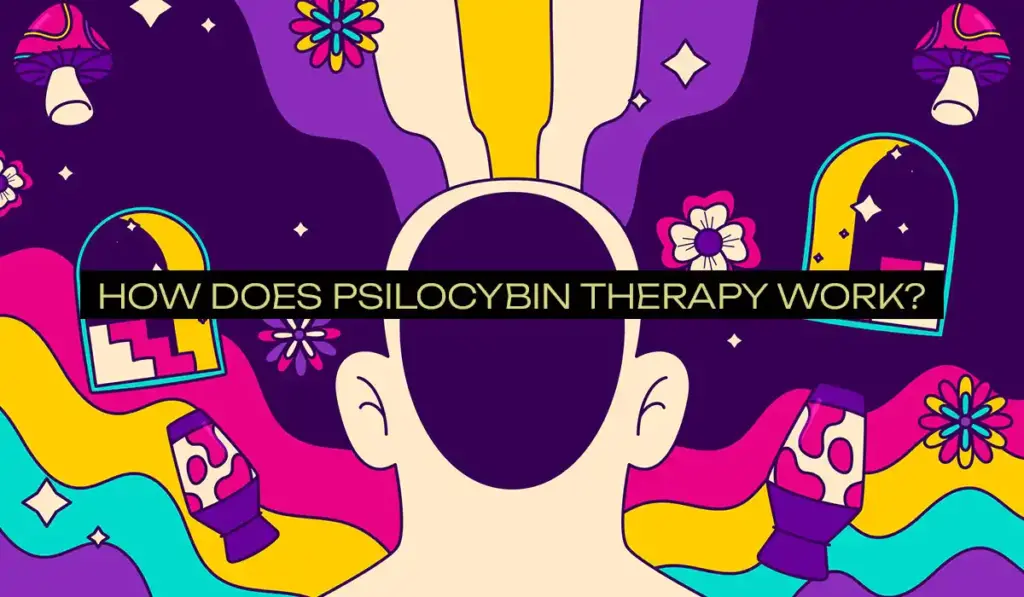
Psilocybin interacts with the brain’s serotonin receptors, which has a cascade of effects including increased neural activity and flexible thinking, deactivation of the DMN (default mode network), increased introspection, and a renewed sense of connection and purpose.
For many people though, these experiences can be even more valuable when additional processing occurs. In the psychedelic space, this is referred to as integration. Integration ensures that your insights become woven into your daily life, and traditional therapy methods have proven immensely valuable in the integration process.
A step-by-step guide to Psilocybin Therapy
Psilocybin therapy is usually broken out into three distinct journeys: preparation, psilocybin session(s), and integration.
Step 1: Preparation
- Psychological Assessment: Individuals undergo a thorough assessment by a qualified professional to gauge their suitability for psilocybin therapy.
- Safe Environment: A comfortable and secure physical setting is arranged for the therapy session.
- Expectation Setting: Clear communication of expectations and potential effects helps set a positive mindset.
Step 2: Psilocybin Session(s)
- Trained Clinicians: Sessions are conducted in the presence of trained therapists or facilitators to ensure safety throughout the experience.
- Controlled Environment: The therapy room is equipped with carefully selected elements like music, eye shades, and more to enhance the therapeutic experience.
- Introspective Activities: Individuals are encouraged to engage in introspective activities, exploring their thoughts and emotions.
- Amount of Sessions: Most research suggests that one to three sessions over the course of a year to be most effective for many individuals.
Step 3: Follow-Up
- Integration Sessions: Post-session integration sessions are conducted to help individuals process and make sense of their experiences.
- Supplemental Tools: The therapist may introduce additional tools to the individual to support their integration process including art, music, or nature therapy.
Psilocybin Use in Therapeutic Settings
Psilocybin-supported therapy has been granted “Breakthrough Therapy” status by the FDA for certain types of depression. In addition, this type of therapy is also showing promise in supporting addiction recovery and OCD.
- Depression: Psilocybin therapy has been shown to decrease activation of the brain’s Default Mode Network (DMN). Overactivation of this brain region has been linked to increased risk of depression.
- Addiction: In 2014, Johns Hopkins University completed a pilot study to investigate the role of psilocybin-assisted therapy in helping individuals quit smoking. Six months after the therapy, a notable 80% (12 out of 15 participants) maintained their abstinence. Experts believe that psilocybin therapy may be effective for addiction to other substances as well.
- OCD: The altered state induced by psilocybin may provide individuals with a temporary reprieve from the obsessive cycle, allowing for a fresh perspective. Learn more here: Psilocybin for OCD.
Benefits of Psilocybin Treatment
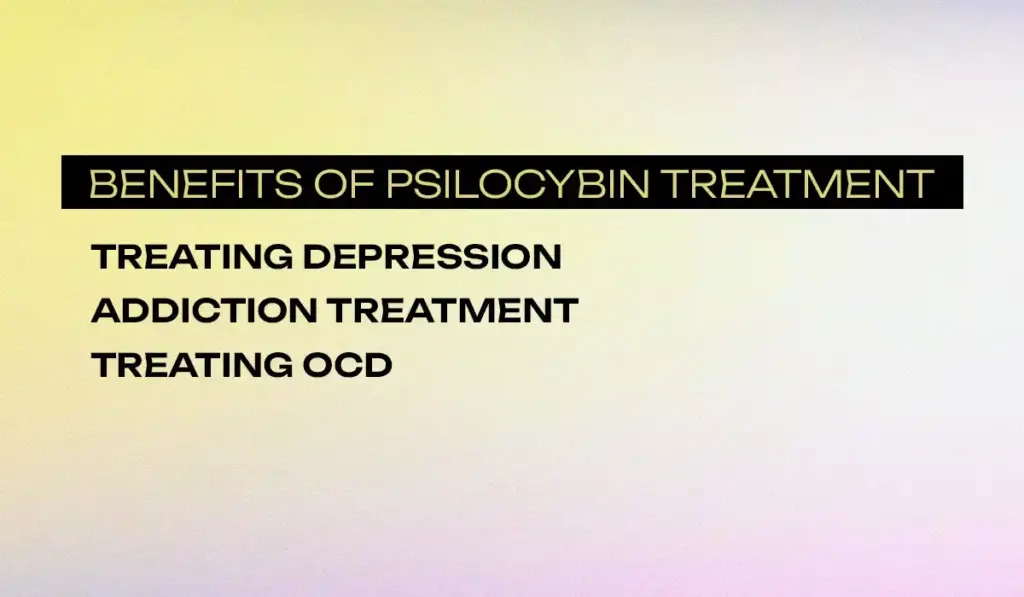
The main benefits of psilocybin therapy include increased self-compassion and acceptance, reduced fear, increased motivation, emotional regulation, and neuroplasticity.
- Increased self-compassion and acceptance: The therapy may foster self-compassion and acceptance, potentially leading to healthier coping mechanisms for depression and other mental health conditions.
- Reduced fear: The therapy might help individuals confront their fears and reduce avoidance behaviors contributing to anxiety.
- Increased motivation for change: Enhanced self-awareness and motivation for positive change has been seen in studies on psilocybin-supported therapy patients.
- Improved emotional regulation: The therapy may help individuals develop better emotional regulation skills.
- Long-term restructuring of brain: Many studies show psilocybin’s potential for neuroplasticity, making it easier for people to shift negative thought patterns long-term.
Risks and Side Effects of Psilocybin Therapy
The risks and side effects of psilocybin therapy may include psychosis or flashbacks, depersonalization or derealization, increased heart rate and blood pressure, and physical discomfort.
- Psychosis or flashbacks: In rare cases, psilocybin can trigger psychotic episodes or flashbacks in individuals with pre-existing vulnerabilities or mental health conditions.
- Depersonalization or derealization: These experiences, involving a sense of detachment from oneself or reality, can occur during or after psilocybin use and can be unsettling.
- Increased heart rate and blood pressure: Psilocybin can temporarily elevate heart rate and blood pressure, potentially posing risks for individuals with pre-existing cardiovascular conditions.
- Physical Discomfort: Nausea, vomiting, and other physical discomforts can sometimes occur during or after a psilocybin experience.
An emphasis on careful screening and assessment, preparation, and focus on set and setting greatly minimize the risks of these occurring, especially when under the guidance of a trained practitioner.
FAQs
Are magic mushrooms good for depression?
Psychedelic research suggests that psilocybin-assisted therapy can be effective in managing depression.
Is psilocybin-therapy legal in Canada?
While promising research exists, psilocybin therapy remains legally restricted in Canada. Currently, access is only granted on a case-by-case basis for individual patients through a special program, not for general use.
Final Thoughts
Psilocybin supported therapy is a unique approach to supporting mental health struggles such as depression, anxiety, and addiction. It is novel in that it combines that neuroplastic power of psilocybin with traditional therapy methods.
Proponents believe that this type of therapy may be more effective than either psilocybin use or traditional therapy methods on their own. Research is being fast tracked in many countries, although legal access to psilocybin-supported therapy in many countries remains inaccessible for most at the time of publishing this article.
If you want to get help with psilocybin therapy or a one-on-one call with a microdosing coach, click here: 1:1 Microdosing Coaching Call.
References
- Psilocybin and Mental Health: The Magic in the Mushrooms | ASM.org. (n.d.). ASM.org. https://asm.org/articles/2023/february/psilocybin-and-mental-health-the-magic-in-the-mush
- Johns Hopkins Center for Psychedelic and Consciousness Research. (n.d.). https://www.hopkinsmedicine.org/psychiatry/research/psychedelics-research
- Johnson, M. W., & Griffiths, R. R. (2017, July 1). Potential Therapeutic Effects of Psilocybin. Neurotherapeutics. https://doi.org/10.1007/s13311-017-0542-y
- Kelmendi, B., Kichuk, S. A., DePalmer, G., Maloney, G., Ching, T. H. W., Belser, A. B., & Pittenger, C. (2022, December 1). Single-dose psilocybin for treatment-resistant obsessive-compulsive disorder: A case report. Heliyon. https://doi.org/10.1016/j.heliyon.2022.e12135
- Coppola, M., Bevione, F., & Mondola, R. (2022). Psilocybin for Treating Psychiatric Disorders: A Psychonaut Legend or a Promising Therapeutic Perspective? Journal of Xenobiotics, 12(1), 41-52. https://doi.org/10.3390/jox12010004
- Can Magic Mushrooms Help Ease Anxiety and Depression? (2023, December 21). Right as Rain by UW Medicine. https://rightasrain.uwmedicine.org/mind/mental-health/psilocybin-treat-depression-anxiety
- Bogadi, M., & Kaštelan, S. (2021). A potential effect of psilocybin on anxiety in neurotic personality structures in adolescents. Croatian Medical Journal, 62(5), 528-530. https://doi.org/10.3325/cmj.2021.62.528
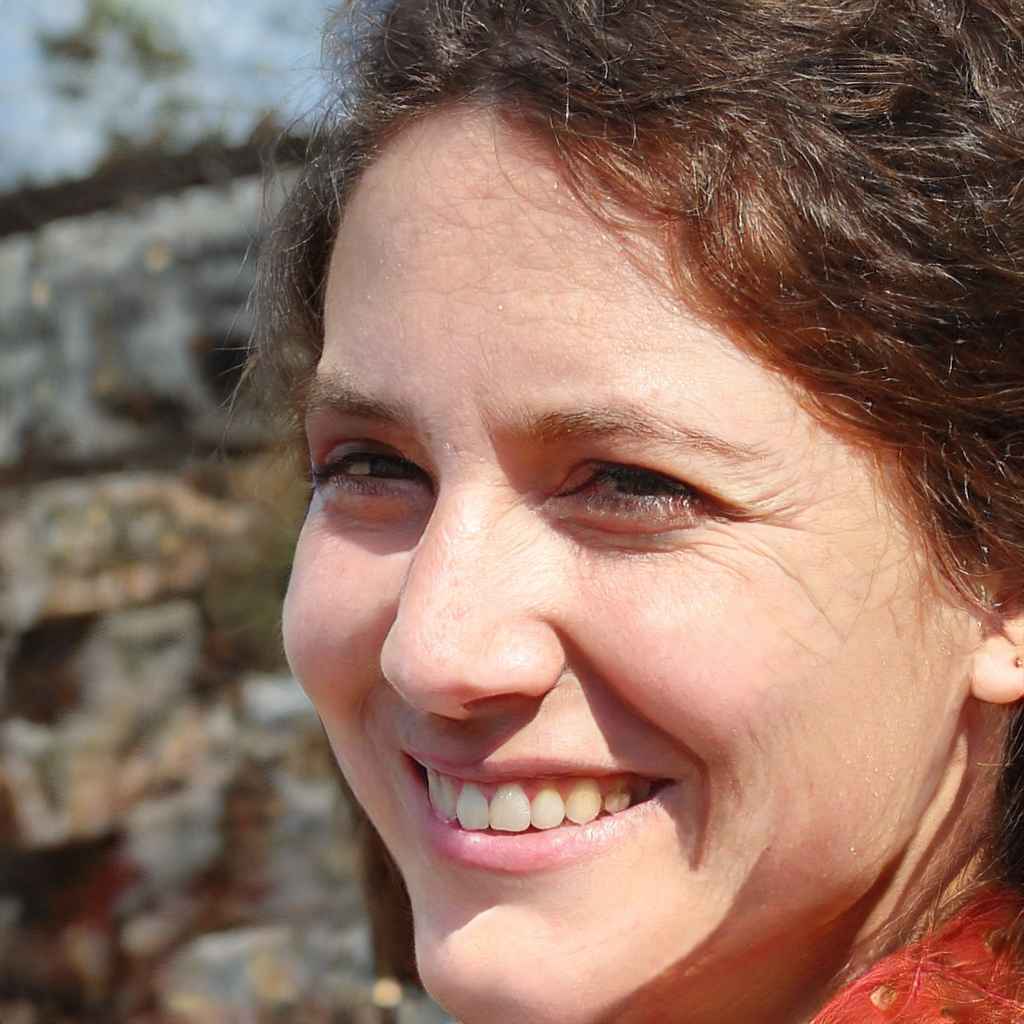
By Rachel Grey
I’m Rachel Grey, a Ph.D. psychologist specializing in psychedelic therapy with psilocybin and natural plant medicines. I obtained my doctorate from the University of Toronto, where I immersed myself in the study of these transformative therapies. With over 10 years of experience, let’s embark on transformative journeys of healing, growth, and self-discovery as we explore the power of psychedelic therapy together.



